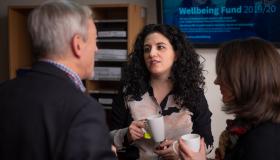Breadcrumbs navigation
Distinguished Excellence in Teaching International Studies Prize
The aim of this annual award is to recognise established academics, or teams of academics, who have contributed to the positive learning experience of students in International Studies. A positive contribution could include bringing new ideas (including from your research field) to existing higher education institutions and your current teaching, or creating the beginnings of new innovative teaching pedagogical theory, styles, practices, or methods, or offering examples of best practice in teaching, or offering evidence of best practice in teaching.
You will have held an academic position that involves regular teaching commitments for at least five years and will have contributed to learning and teaching in International Studies through a systematic or wide-ranging set of activities or contributed to the dissemination of best practice in teaching and learning among BISA members, for example.
There has never been as strong a focus on learning and teaching as there is now. Winning this award could place you at the forefront of inspiring others to develop teaching excellence.
The award winner will be decided by a judging panel led by the trustee responsible for Learning and Teaching. The winner will be formally announced, and the award presented, at our annual conference.

Nominations and guidance
You can nominate yourself or colleagues for this award. Departments are asked to encourage and support outstanding teachers to apply. We encourage submissions from mid-career colleagues and from teaching teams.
Nominations open Wednesday 8 January 2025 and close on Monday 10 February at 11.59pm (UK time). NOW EXTENDED to Monday 24 February at 11.59PM (UK time). Nominations made outside of this period will not be considered.
To nominate please complete our online form. You’ll need to write a statement of case (max 500 words) and supporting evidence. We are particularly interested to hear about teaching practices that demonstrate excellence in learning opportunities and learning experiences for students in International Studies. Submissions that demonstrate innovation in teaching are welcome but are not required.
Your explanation and evidence should demonstrate:
- A positive contribution to learning and teaching
- where relevant, the use of innovative teaching strategies
- meeting the needs of a diverse student population
- stimulating independent learning and critical thinking
- if appropriate, evidence of successful dissemination of best practice in teaching and learning in International Studies.
You are also expected to submit evidence in support of your application that includes:
- The module outline (the document that states module learning objectives, aims, contact hours, modes of learning, etc).
- The module handbook (including reading list) is also encouraged but as these are often digital it is not required.
In addition, we encourage you to submit up to two of the following:
- recent formal and informal feedback from students or peer review
- student testimonials
- a short statement of support from a colleague
- details of relevant publications and conference papers/presentations.
Supporting materials must be uploaded as a single pdf document.
Conditions of the award
If you win this award we’ll also ask you to write an article (500-1000 words) to be published on our website summarising your award-winning teaching activities. This article must be submitted electronically to the BISA office within one month of the presentation of the award at our annual conference. Undertaking these activities will mean that your best practice can be shared amongst other colleagues both in IR and further afield.
Have a query?
Enquiries about the prize and the process of nomination should be sent to the chair of the prize committee, Professor Ilan Baron: ilan.baron@durham.ac.uk.
Past recipients
- 2024 No award given
- 2023 Laura Mills (St Andrews)
- 2022 Joint winners: Claire Timperley and Kate Schick, Te Herenga Waka-Victoria University of Wellington; and Michelle Bentley, Alex Gilder, Daniela Lai, Nicola Antoniou (Royal Holloway, University of London), and Nasir Ali (University of Hargeisa (Somaliland))
- 2021 Award furloughed due to COVID-19
- 2020 No award given
- 2019 Alexandros Koutsoukis and Jenny Mathers (joint winners) (Aberystwyth University)
- 2018 Dr Naomi Head (University of Glasgow)
- 2017 Erzsébet Strausz (University of Warwick)
- 2016 William Brown, Olaf Corry, Agnes Czajka and Emma Mayhew (joint winners) (Open University/University of Reading)
- 2015 Dr Jelena Obradovic-Wochnik (Aston University)
- 2014 Adjustment for change of conference date
- 2013 Dr Jack Holland (University of Surrey)
- 2012 Dr Nick Robinson Professor, Andreas Bieler and Dr Adam Morton (joint winners) (University of Leeds/University of Nottingham)
- 2011 Dr Ayla Gol (Aberystwyth University)
- 2010 Govinda Clayton and Dr Ismere Gizelis (University of Kent)
- 2009 Dr Elena Korosteleva- Polglase (Aberystwyth University)
- 2008 Inaugural prize Dr Betts Featherston (University of Bradford)